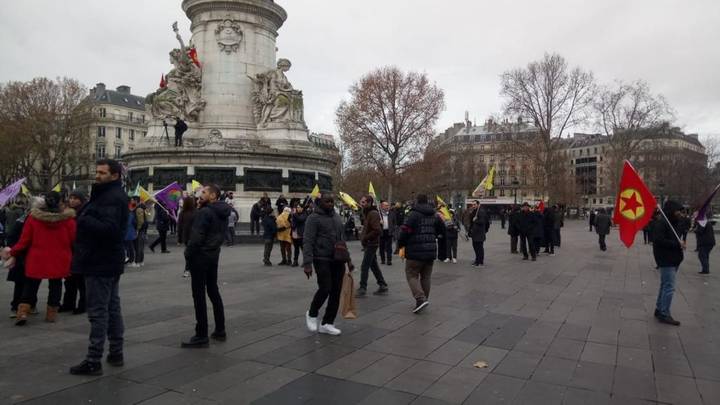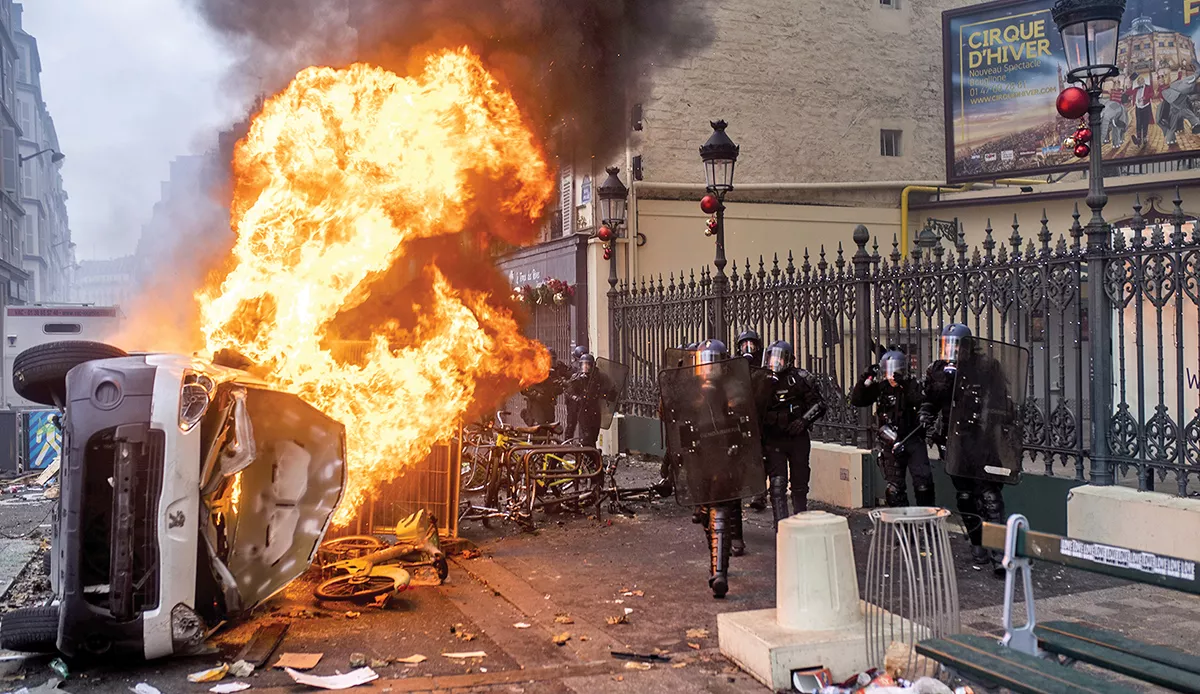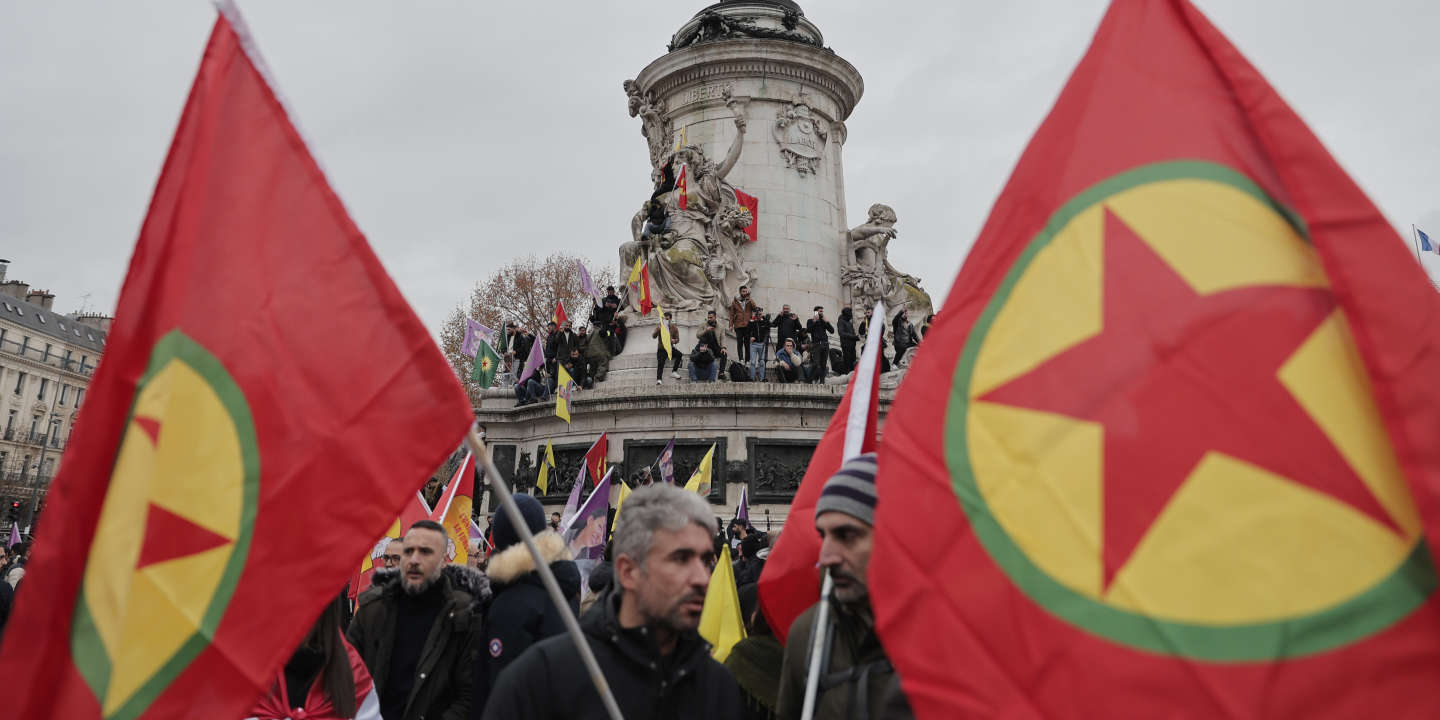Why Should France Reassess the Presence of the Terrorist PKK/PYD in Its Territory?

Shortly after a gunman opened fire on civilians in Paris on December 23, supporters of the PYD/PKK terrorist group in the French capital staged protests against the alleged racist attack to the extent that the violence caused by the protests overshadowed the violence of the original incident itself.
The violence left devastation on Place de la Republique and along the Boulevard, two of Paris’ most prominent landmarks, where supporters of the PYD/PKK terrorist clashed with police on an unprecedented scale, even targeting French Interior Minister Gerald Darmanin, who visited the scene of the attack.
Bus stops were destroyed, sidewalk stones were pulled out, and nearby homes, shops, and police stations were attacked. In the end, at least 31 French police officers were injured.
French police intervention against the actions of PYD/PKK supporters has now turned out to be more restrained than the force used to suppress the yellow vest protests, which are popular civic demonstrations in France that have been ongoing since 2018 against deteriorating economic conditions.
It is impossible to assess developments in France as merely an act of a group of protesters or actions taken against a particular demand, but it is evident that those who have turned the streets of Paris into a war zone are mostly supporters of the PYD/PKK terrorist, designated a terrorist organization by Turkiye, the European Union, and the United States.
The raising of flags allegedly representing the PYD/PKK terrorist in Paris during the wave of violence also poses a direct threat to public order in France, as they represent a terrorist organization that has killed and harmed thousands of civilians.

Black Propaganda
Just as in some European countries, the PYD/PKK terrorist group has a presence in France through numerous NGOs, institutions, and institutes.
Since the eighties, the PKK terrorist group has received financial support from countries, organizations, and individuals from Europe, which sought to use this support in planning and executing terrorist activities against Turkiye.
In France alone, more than 20 organizations are wholly or partly affiliated with the terrorist PYD/PKK, including a women’s organization that is seen as concerned with gender equality and the environment in order to create the impression of being a civil society organization.
France is also emerging as one of the centers where the PYD/PKK terrorist may recruit young people brought from Turkiye and use them in propaganda activities for the terrorist organization, both inside and outside Europe.
The PKK and its affiliates have shown no remorse in recruiting children and using women as pawns in their terrorist campaigns, stretching from Iraq to Syria and along the road threatening Turkiye’s borders. This issue became prominent several times, with the US releasing a full report in July last year revealing the extent of the PKK’s involvement in recruiting child soldiers.
While remaining silent in the face of widespread vandalism, supporters of the PYD/PKK terrorist and relevant media claimed that the attack in Paris and the violence that followed were linked to Turkiye.

This black propaganda has gone so far as to circulate rumors suggesting that the 69-year-old gunman, a retired mechanic, was a Turk named Mehmet, shortened to William M.
French media reported that the attack, which was the main argument for supporters of the PYD/PKK terrorist, was carried out by people linked to Turkiye.
Media coverage of PKK’s arguments in mainstream French newspapers also points to the group’s efforts to use social and traditional media as a means to advance its own narrative of the attack.
In the midst of the propaganda campaign, the reality of the attacker’s personal, social, and health problems emerged—identifying him as a racist far-right with a criminal history. William appeared to hold pathological xenophobia, which was the cause of his deliberate attack.
French authorities responded in the same vein: treating him as an isolated campaign by an individual with mental health issues.
But in refusing to summon supporters of the PYD/PKK terrorist, the French state has stabilized the organizational structures of the PKK in French society.
After the events in Paris, Turkiye felt the need to respond diplomatically. Herve Magro, the French ambassador in Ankara, was summoned to the Turkish Foreign Ministry.
He told the ambassador in no uncertain terms about Turkish annoyance that PKK/PYD terrorist circles had started anti-Turkish propaganda in the wake of the attack in Paris.
Presidential spokesman Ibrahim Kalin questioned why the French authorities remained silent after the French-backed PKK/YPG terrorist organization in Syria caused the destruction on the streets of Paris.
On the one hand, developments in Paris are linked to French foreign policy and its consequences for domestic policy.
Along with some European countries, France has refrained for years from sharing Turkiye’s concerns about the PKK/PYD.
Besides, it has created a social and political platform for the organization and its supporters to deploy and operate in their country.
However, the violence in Paris must be an inflection point for France for it to have a clearer understanding of Turkiye’s arguments on the issue.
Mehmet Rakipoglu, a Turkish international relations expert, said that “what happened in France proved that European countries’ funding of terrorist organizations does not prevent terrorists such as the PKK from attacking them.”

Cost of Inaction
Gokhan Ereli, the Gulf Studies Coordinator at the Center for Middle Eastern Studies (ORSAM), wrote an article for TRT World saying that portraying the attack in France as the work of a racist with only mental problems ignores the country’s growing right-wing extremism.
He added that the PKK/PYD’s terrorist sabotage on the streets of Paris, coupled with the French government’s condoning of events, is likely to accelerate far-right operations against minorities.
According to Ereli, just as the PKK’s efforts to secure their presence in France under the guise of protecting themselves from the far-right, some French far-right leaders have also criticized the case and politicized it for the French government’s failure to act on the attacks.
In addition, PKK supporters must be prevented from pursuing social and political legitimacy in France under the pretext of fighting against the extreme right.
At the same time, the silence of the French authorities in the face of related violence may increase the terrorist group’s efforts to portray itself as a group seeking to defend human rights. It may also try to show itself as a victim through its various wings in France.
What is clear from the Paris violence is that refraining from labeling PKK as a terrorist group and treating it accordingly is likely to have negative consequences for states. The slogan “No one is safe until everyone is safe,” often emphasized by Turkish officials, shows the overall nature of security today.
“At a time when Turkiye’s relations with Sweden and Finland have brought with it a re-evaluation of the terrorist organization’s structures and actions in Europe, maybe it is time for the French authorities to re-evaluate the PKK/YPG for the safety of Parisians, the French people and everyone in the region,” Ereli concluded.











